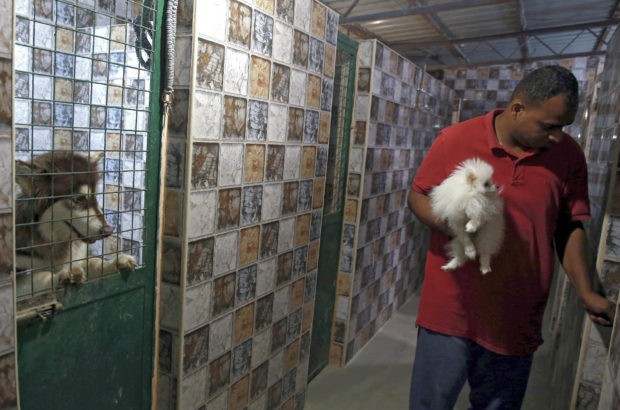
DOG CARE A staff member at ìPet Zoneî, a pet health center in Amman, opens a kennel door at the “dog hotel.” Where strays were once mostly left to scavenge for food, Jordanians, in a new trend in the Arab kingdom, are increasingly willing to foot steep bills to care for beloved dogs and cats. —AFP
AMMAN — It used to be unthinkable for people to walk dogs around the streets of Amman. Now pet hotels are sprouting up across Jordan.
Strays were once left to scavenge for food. Jordanians now foot bills to care for beloved dogs and cats.
The average monthly wage is just $600, but they fork out for accessories and top-notch care.
Marwan al-Haj Ali, who opened the first hotel and training center for dogs in Jordan in 2018, noted the “remarkable” rise in the number of pet owners.
Purr-fect
Here, favorite fur balls can indulge in dog nail trimming for 10 Jordanian dinars ($14), hair clipping and bathing, as well as a hair-dry to keep pelts looking purr-fect.
Room and board costs three Jordanian dinars ($4) a day. Anxious owners keep an eye on pets via online cameras.
“Twenty years ago if you told anyone you were leaving your dog in a hotel, he or she would have laughed at you,” said Haj Ali.
More Jordanians now breed dogs and cats, and owners proudly stroll through the capital with pets on a leash.
‘Part of the family’
“It used to be embarrassing,”said owner Alaa Kalemat.
The 29-year-old medical center worker considers her small, white chihuahua terrier mix, Lucy, a member of the family. Price is no object when it comes to her care.
“I don’t feel that costs are important, compared to Lucy’s importance,” she said during her pet’s routine checkup.
Unemployment in Jordan is at 19 percent and the poverty rate hovers at more than 15 percent. Looking after pets is a struggle for many.
“It is a burden on the monthly budget,” noted Sami George, owner of a grey French terrier. “Everything is expensive in Jordan and that applies of course to pet food, accessories and healthcare.”
In recent years, anger at rising costs and price hikes have spilled over into street protests.
The cash-strapped country is highly dependent on foreign aid and grapples with debt that has risen to more than 96 percent of GDP.
Costly, new treatmentsDespite the bite out of their wallets, Jordanians appear to prefer larger breeds like German shepherds and huskies.
Puppies don’t come cheap. Prices for bigger breeds start around $140 and soar to as much as $1,700 — not to mention the costs of routine medical care such as vaccines and neutering.
Alaa Shehadeh, director of Vetzone, checked his monitors as he and his colleagues examined Navy, a Pitbull with a spinal disc problem.
“Medical care is very expensive because of the cost of the equipment used,” he said. X-rays for example, cost between $20 and $50.
Pensioner Rima Abu Zahra said she would do everything for her pets. “It is like having an extra child, whatever the cost is, he or she is my responsibility.”
Facebook groups are springing up where owners share tips about adoptions and how to help strays. Dog license regulations were amended in 2016 to take account of the new trend.
“More people are having pets, especially dogs. We need to regulate to make sure that most pets are well taken care of,” said Mervat Mhairat, from the Amman municipality.